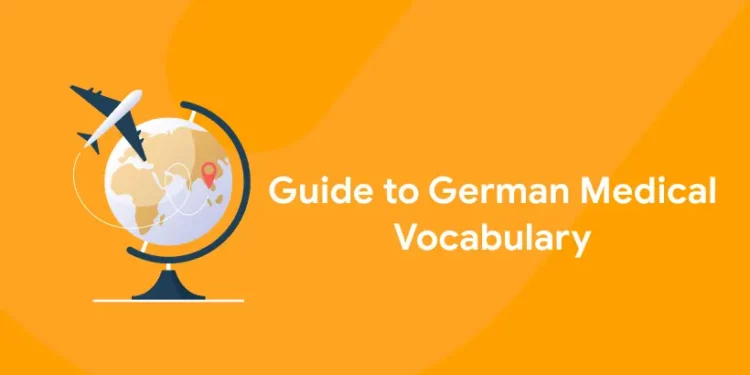Table of Contents
Expanding your vocabulary is one of the most important parts of learning a new language, particularly when you need it most, like when you’re sick. This guide demonstrates key German terms associated with illness and health, enabling you to speak clearly in a variety of contexts. This vocabulary will be very helpful whether you’re seeing a doctor in Germany, describing symptoms, or just comprehending discussions about health. So let us learn some basic words that come under German medical Vocabulary.
Want to learn German C2 level? Join the Entri Elevate German course today!
Guide to German Medical Vocabulary: Introduction
Healthcare workers who interact with German-speaking patients or coworkers must know the basics of the language. Increasing your medical vocabulary in German is essential when you visit a doctor in a German-speaking nation. On the one hand, many medical personnel can communicate in English. However, communicating effectively and comprehending what’s happening around you in an emergency can help reduce the tension. Additionally, it might be necessary for you to pick up medication from the pharmacy (Apotheke). What if the pharmacists don’t speak English well? All of this points to the importance of learning a few German Medical Vocabulary before travelling to Germany.
Top German Medical Vocabulary Lists
1: How do you say "Good Morning" in German?
Some of the most common words in the German Medical Vocabulary are discussed in this section. Let us look at them.
| English | German |
| contagious | ansteckend |
| the male doctor | der Arzt |
| the female doctor | die Ärztin |
| to treat | behandeln |
| the blood pressure | der Blutdruck |
| to bleed | bluten |
| the blood test | die Blutprobe |
| the male surgeon | der Chirurg |
| the female surgeon | die Chirurgin |
| the surgery | der chirurgische Eingriff |
| the concussion | die Gehirnerschütterung |
| the health | die Gesundheit |
| the hospital bed | das Krankenbett |
| the hospital | das Krankenhaus |
| the ambulance | der Krankenwagen |
| the wheelchair | der Rollstuhl |
| the female patient | die Patientin |
| the male patient | der Patient |
| the female emergency physician’s | die Notärztin |
| the male emergency physician | der Notarzt |
| the symptom | das Symptom |
| the insurance card | die Versicherungskarte |
| the bandage | das Verband |
| to examine | untersuchen |
| the thermometer | das Thermometer |
| the appointment | der Termin |
| sick note for work | die Krankschreibung |
| the hospital room | das Krankenzimmer |
| the health insurance | die Krankenversicherung |
| the injury | die Verletzung |
| the nurse | die Krankenschwester |
German Body Parts Vocabulary
Trying to describe a health ailment without knowing the names of body parts is a useless pursuit. So, let us look at a few of them.
| English | German |
| the arteries | die Arterien |
| the blood type | die Blutgruppe |
| the brain | das Gehirn |
| the bone | der Knochen |
| the body | der Körper |
| the muscle | der Muskel |
| the nerves | die Nerven |
| the back | der Rücken |
| the torso | der Rumpf |
| the veins | die Venen |
You might be now wondering if this small list of words is enough to describe all the ailments a body can have. Of course not. You can read the detailed blog about German body parts vocabulary for more information.
Click here to read the German body parts vocabulary blog!
Rooms in Hospital
Studying the following words will help you find the room you need to go to in hospital by reading and navigating the signboards in the hospital.
| English | German |
| the maternity ward | die Entbindungsstation |
| intensive care | die Intensivpflege |
| the hospital | das Krankenhaus |
| the laboratory | das Labor |
| patient admission area | die Patientenaufnahme |
| nursing station | die Pflegestation |
| the doctor’s office | die Praxis |
| the x-ray room | die Röntgenaufnahme |
| the consultation room | das Sprechzimmer |
| the emergency room | die Notaufnahme |
| consultation hours | die Sprechstunde |
| the waiting room | das Wartezimmer |
Sense and Perception
The German nouns and verbs listed below can assist you in describing problems related to your sense of taste, hearing, or vision.
| English | German |
| to touch | berühren |
| the sense of touch | der Tastsinn |
| to see | sehen |
| the eyesight | das Sehvermögen |
| to taste | schmecken |
| the sense of taste | der Geschmacksinn |
| to smell | riechen |
| the sense of smell | der Geruchssinn |
| to hear | hören |
| the hearing | das Gehör |
| to stay balanced | im Gleichgewicht halten |
| the balance | das Gleichgewicht |
Names of Specialists
Names used to refer to specialist doctors are listed below.
| English | German |
| Neurologist | Neurologe |
| Nurse | Krankenschwester |
| Pediatrician | Kinderarzt |
| Cardiologist | Kardiologe |
| Immunologist | Immunologe |
| Histologist | Histologe |
| Dermatologist | Hautarzt |
| Haematologist | Hämatologe |
| Otorhinolaryngologist | Hals-Nasen-Ohrenarzt |
| Gynaecologist/Obstetrician | Gynäkologe/Geburtshelfer |
| Geriatrician | Geriater |
| gastroenterologist | Gastroenterologe |
| Endocrinologist | Endokrinologe |
| Embryologist | Embryologe |
| Surgeon | Chirurg |
| Optometrist | Augenarzt |
| Pharmacist | Apotheker |
| Anesthetist | Anästhesist |
| Dentist | Zahnarzt |
| Virologist | Virologe |
| Urologist | Urologe |
| Rheumatologist | Rheumatologe |
| Radiologist | Radiologe |
| Psychologist | Psychologe |
| Psychiatrist | Psychiater |
| Parasitologist | Parasitologe |
| Orthopedic surgeon | Orthopäde |
| Oncologist | Onkologe |
Name of Ailments or Symptoms
You could have symptoms or a known health issue, among other things. The terms for symptoms are listed in the following table to assist you in describing the problem.
| English | German |
| Allergies | die Allergien |
| Ache | die Schmerzen |
| Backache | die Rueckenschmerzen |
| Blister | die Blase |
| Chills | das Kältegefühl |
| Broken | gebrochen |
| Constipation | die Verstopfung |
| Cough | der Husten |
| Diarrhea | der Durchfall |
| Faint | Schwach |
| Dizzy | Schwindlig |
| Fever | das Fieber |
| Infection | Infektion |
| Headache | die Kopfschmerzen |
| Injured | Verletzt |
| Joint | das Gelenk |
| Itching | das Jucken |
| Migraine | die Migrane |
| Nauseous | Uebel/ die Übelkeit |
| Muscle pains | die Muskelschmerzen |
| Pain | der Schmerz |
| Sick | Krank |
| Rash | Hautausschlag |
| Sleeplessness | die Schlaflosigkeit |
| Unwell | Unwohl |
| Swelling | die Schwellung |
| Vomit | das Erbrechen |
| Wheezing | das Keuchen |
| Weak | Schwach |
| the breathlessness | die Atemlosigkeit |
| pins and needles feeling | das Kribbeln |
| gasstrointestinal complaints | die Magen-Darm-Beschwerden |
| the pflegm | der Schleim |
| the constipation | die Verstopfung |
| the runny nose | die laufende Nase |
Name of Diseases Part 1
Once you have described the symptoms, the doctor will give a diagnosis. You should know the following words to understand the diagnosis.
| English | German |
| The abscess | der Abszess |
| Attention Deficit Disorder | Aufmerksamkeits-Defizit-Störung |
| the acne | die Akne |
| The allergy | die Allergie |
| Alzheimer’s disease | die Alzheimer Krankheit |
| The Arthritis | die Arthritis |
| The Asthma | das Asthma |
| The blood poisoning | die Blutvergiftung |
| The high blood pressure | der Bluthochdruck |
| the bronchitis | die Bronchitis |
| the chronic disease | die chronische Krankheit |
| the diabetic | der Diabetiker/die Diabetikerin |
| The diarrhoea | der Durchfall |
| The infection | die Entzündung |
| The epilepsy | die Epilepsie |
| The cold | die Erkältung |
| The bone fracture | der Knochenbruch |
| The collapsed lung | die kollabierte Lunge |
| The headache | die Kopfschmerzen |
| The cancer | der Krebs |
| The illness | die Krankheit |
| The circulatory problem | die Kreislaufstörung |
Name of Diseases Part 2
The names of some more diseases are listed below.
| English | German |
| the flu | die Grippe |
| the health | die Gesundheit |
| the ulcer | das Geschwür |
| the STD | die Geschlechtskrankheit |
| the jaundice | die Gelbsucht |
| the gall stones | die Gallensteine |
| the fever | das Fieber |
| the heart attack | der Herzinfarkt |
| the heart palpitations | das Herzklopfen |
| the heart disease | die Herzkrankheit |
| the hay fever | der Heuschnupfen |
| the hernia | der Leistenbruch |
| the food allergy | die Lebensmittelallergie |
| the pneumonia | die Lungenentzündung |
| the migraine | die Migräne |
| the multiple sclerosis | die multiple Sklerose |
| the side effects | die Nebenwirkungen |
| the kidney stone | der Nierenstein |
| the renal failure | das Nierenversagen |
| Parkinson’s disease | die Parkinson-Krankheit |
| the rheumatism | das Rheuma |
| the stroke | der Schlaganfall |
| the whiplash | das Schleudertrauma |
| the cut | die Schnittwunde |
Name of Diseases Part 3
The Third list of diseases in Germany is given below.
| English | German |
| the cold | der Schnupfen |
| the dandruff | die Schuppen |
| Chickenpox | die Windpocken |
| the psoriasis | die Schuppenflechte |
| Depression | die Depression |
| the heartburn | das Sodbrennen |
| the sunburn | der Sonnenbrand |
| rabies | die Tollwut |
| the infertility | die Unfruchtbarkeit |
| the sprain | die Verstauchung |
| the vitamin deficiency | der Vitaminmangel |
| the wound | die Wunde |
| Cold | der Schnupfen |
| Inflamed | Entzuendet |
| Inflammation | Entzündung |
| Influenza | die Grippe |
| Pregnant | Schwanger |
Names of Medicines
Names of various types of medicines are listed below.
| German | English |
| das Verhuetungsmittel | Contraceptive |
| Anti-inflammatory | das Entzündungshemmende |
| Antibiotics | die Antibiotika |
| Injection | die Spritze |
| Medication | die Medikamente |
| Pain killer | das Schmerzmittel |
Terms Essential for Pharmacy Visit
You receive a prescription for medication after you visit the doctor or hospital. Some words that are essential for a pharmacy visit.
| English | German |
| Pharmacy | Apotheke |
| the pill | die Tablette |
| the sunscreen | die Sonnencreme |
| the pregnancy test | der Schwangerschaftstest |
| the painkiller | die Schmerztablette |
| the splint | die Schiene |
| the ointment | die Salbe |
| the prescription | das Rezept |
| the bandage | das Pflaster |
| the nasal spray | das Nasenspray |
| the medicine | die Medizin |
| the mask | die Maske |
| the crutches | die Krücke |
| the condom | das Kondom |
| the insulin | das Insulin |
| the vaccine | der Impfstoff |
| the cough syrup | der Hustensaft |
| the leaflet in the medicine packet | der Beipackzettel |
| the homoeopathic medicine | das homöopathische Arzneimittel |
| the cast | der Gips |
| birth control pills | die Antibabypille |
| the decongestant | das abschwellende Mittel |
| the laxative | das Abführmittel |
| the thermometer | das Thermometer |
| the first-aid kit | der Verbandkasten |
| the vitamin | das Vitamin |
Vocabulary for Dentist Visit
Some words essential for a dentist visit are given below.
| English | German |
| the mouthwash | das Mundwasser |
| Toothbrush | die Zahnbürste |
| Toothpaste | die Zahnpasta |
| Dental floss | die Zahnseide |
| the tooth | der Zahn |
| the upper teeth | die oberen Zähne |
| the lower teeth | die unteren Zähne |
| the molar | der Backenzahn |
| the premolar tooth | der Prämolar |
| the incisor | der Schneidezahn |
| the wisdom tooth | der Weisheitszahn |
| the root | die Wurzel |
| the gum | das Zahnfleisch |
| the tooth pulp | das Zahnmark |
| the tooth enamel | der Zahnschmelz |
| the cavities | die Karies |
| the plaque | der Zahnbelag |
| gum inflammation | die Zahnfleischschwellung |
| nerve inflammation | die Zahnmarkentzündung |
| the tartar | der Zahnstein |
Dental Treatment Vocabulary
Some words describing the treatments done by dentists are listed below.
| English | German |
| grey filling | das Amalgam |
| dental guard | die Aufbissschiene |
| the bridge | die Brücke |
| the filling | die Füllung |
| orthodontics | die Kieferorthopädie |
| the ceramic cap | die Keramikkrone |
| white filling | der Komposit |
| the Crown | die Krone |
| the local anaesthetic | die lokale Betäubung |
| the x-ray | das Röntgen |
| the root canal | die Wurzelbehandlung |
| dental | zahnärztlich |
| the tooth whitening | die Zahnaufhellung |
| the teeth cleaning | das Zähneputzen |
| the dental implant | das Zahnimplantat |
| the dentures | die Zahnprothese |
| the dental cleaning | die Zahnreinigung |
| the braces | die Zahnspange |
| the tooth extraction | das Zahnziehen |
| tooth whitening | Zahnaufhellung |
Important Phrases
Some commonly used phrases are listed below.
| German | English |
| Ich fuehle mich echt mies | I’m feeling unwell |
| Mir ist schwindlig | I feel dizzy |
| Hinfallen | To have a fall |
| Sodbrennen haben | To have heartburn |
| Ein Herzleiden haben | To have a heart condition |
| Unter Schlafloesigkeit leiden | To suffer from insomnia |
| Wo tut es weh? | Where does it hurt? |
| Sind Sie gegen irgendetwas allergisch? | Are you allergic to anything? |
| Husten Sie bitte. | Cough, please. |
| Ich verschreibe Ihnen… | I am going to prescribe… |
| Machen sie den Mund auf | Open your mouth. |
Tips for Memorizing and Using German Medical Vocabulary
Some tips for memorising and using German medical vocabulary are listed below.
- Read medical pamphlets or medical blogs in German available on the internet.
- Listen to YouTube programs or podcasts done by German-speaking medical professionals. If the subtitles are also in German, then it is more beneficial.
- Make medical appointments by yourself without taking help of your native friend. Rehearse what you have to say in the call with the said friend before making the call.
Additional Resources for Learning German Vocabulary
Some additional resources for learning German Vocabulary are listed below.
Language Shadowing
You can learn German by imitating the speech of a native speaker. You can do this by imitating the speaking style of podcast hosts, mentors who are native speakers, YouTube personalities or even movie dialogues.
Reading
You can read books to accumulate more vocabulary. Reading a dictionary is boring. It has the further disadvantage that a dictionary doesn’t provide the context in which a word is used or examples of how it is used. A book is a far superior source of language learning in this respect.
Online Course
Joining an online course is going to be very beneficial for speeding up your language learning. Entri Elevate German course has a special focus on German vocabulary. It also has mentors who speak your local language. This course will take you from A1 level proficiency to C2 level proficiency.
Click here to learn more about Entri Elevate German language course!
Guide to German Medical Vocabulary: Conclusion
Anyone living in or visiting German-speaking nations must be able to understand and use the language’s health-related vocabulary. Gaining knowledge of these terms will help you deal with medical situations more confidently. This guide gives you the skills you need to communicate clearly whether you’re picking up medication, seeing a doctor, or explaining symptoms.
Frequently Asked Questions
What are some pointers for learning German for medical purposes?
Focusing on vocabulary relevant to your field, practising pronunciation, memorizing terms with flashcards, and immersing yourself in the language by watching German medical shows or films are some strategies for learning Medical German.
How can Medical German be learned?
Medical German can be learned in several ways, such as by reading medical texts in German, practising with native speakers, using language learning applications, and enrolling in language classes.
Describe Medical German.
The term “medical German” describes the specific language and terms used in Germany’s healthcare sector. Healthcare workers who deal with German-speaking patients or in German-speaking nations must have it.
Why is learning Medical German important?
Healthcare workers who interact with German-speaking patients or who work in German-speaking nations should learn medical German. It enables them to comprehend medical jargon, interact with patients more effectively, and deliver higher-quality care.
Which medical German terms are frequently used?
Krankenhaus (hospital), Arzt (doctor), Krankenschwester (nurse), Medikament (medication), Schmerzen (pain), and Behandlung (treatment) are a few examples of common medical German terms.










